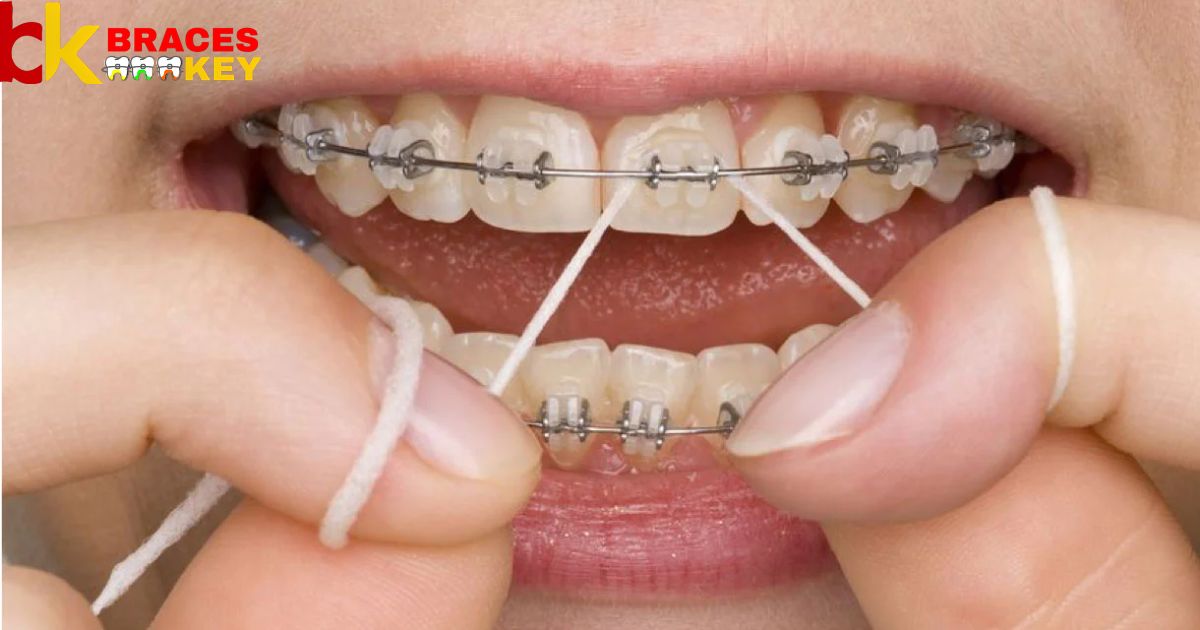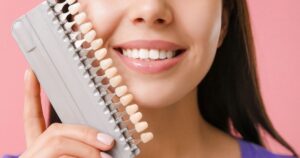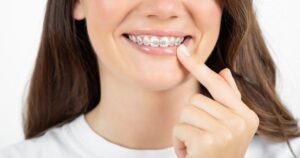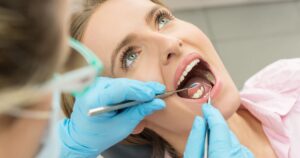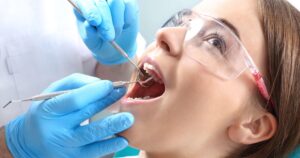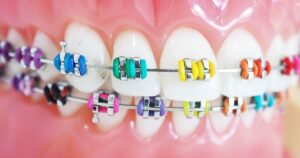Neglecting to floss with braces can lead to plaque buildup, exacerbating oral hygiene challenges. The intricate design of braces creates additional nooks where food particles can accumulate, fostering the risk of cavities and gum issues. Regular flossing remains crucial to prevent complications and maintain optimal dental health during orthodontic treatment.
Ever pondered the repercussions of neglecting to floss amidst the intricate landscape of braces. What happens if you don’t floss with braces? unfolds a narrative of trapped food particles, concealed decay, and the looming consequences when oral hygiene plays second fiddle in the realm of orthodontics.
Neglecting to floss with braces can lead to plaque buildup between teeth and around braces, risking gum inflammation and cavities. The wires and brackets create additional nooks where food particles can accumulate, heightening the importance of regular flossing to maintain oral hygiene during orthodontic treatment.
If You Don’t Floss While You Have Braces
Neglecting to floss while undergoing orthodontic treatment with braces can lead to serious oral health issues. The brackets and wires create additional spaces for plaque and food particles to accumulate, increasing the risk of cavities and gum disease. Regular flossing is crucial to maintaining proper dental hygiene, preventing complications, and ensuring a healthy smile throughout the braces-wearing period.
Apart from the risk of dental problems, the absence of flossing during braces can also impact the overall effectiveness of orthodontic treatment. Accumulated plaque and debris can hinder the movement of teeth, potentially extending the duration of treatment and compromising the desired results. Thus, incorporating diligent flossing into daily oral care routines is essential for both oral health and successful orthodontic outcomes.
To Floss With Braces
Mastering the intricacies of braces care includes addressing unexpected situations like the wire slipping out. Learn how to put the wire back in braces with careful precision, ensuring a seamless continuation of your orthodontic journey. Regular flossing remains crucial for optimal oral hygiene, safeguarding your smile throughout the treatment process.
Orthodontic Risks Amplified
Orthodontic Risks Amplified refers to an escalated vulnerability to potential complications associated with orthodontic treatments. This heightened risk may arise from factors such as improper care, non-compliance with treatment plans, or pre-existing oral health issues. Addressing and mitigating these amplified risks is crucial for ensuring the effectiveness and safety of orthodontic interventions.
Hidden Dangers Amid Brackets
Amid the apparent safety of brackets lie hidden dangers, waiting to disrupt expectations. Whether in coding, where an overlooked bracket can cause errors, or in life, where assumptions may lead to unforeseen consequences, navigating the unseen risks within brackets requires vigilance.
If You Don’t Floss Your Teeth With Braces So the result
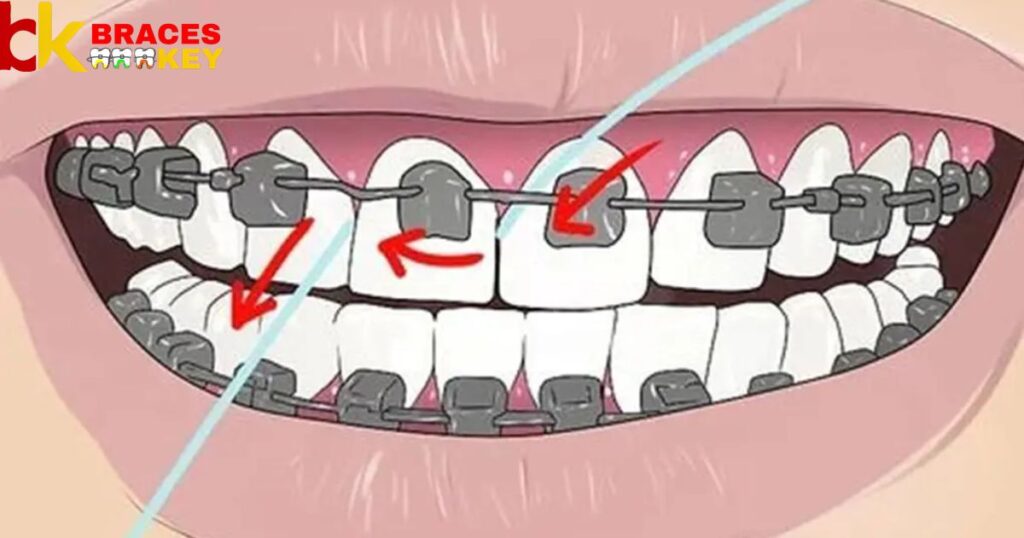
Neglecting to floss your teeth while wearing braces can lead to serious oral health issues. The wires and brackets create additional nooks and crannies where food particles and plaque can accumulate, increasing the risk of cavities and gum disease. Consistent flossing is crucial for maintaining proper oral hygiene during orthodontic treatment, preventing potential complications and ensuring a healthy smile in the long run.
The intricate design of braces creates additional spaces for food particles and plaque to accumulate, increasing the risk of cavities and gum issues. Without proper flossing, the effectiveness of braces in achieving a straight and healthy smile may be compromised, emphasizing the importance of maintaining a thorough oral hygiene routine during orthodontic treatment.
Can’t Floss With Braces Reddit
On Reddit, users often discuss the challenges of flossing with braces. Many share tips and tricks, highlighting the importance of specialized tools like floss threaders and orthodontic floss. The community serves as a valuable resource for individuals navigating the unique aspects of dental care while undergoing orthodontic treatment, fostering a supportive exchange of experiences and advice.
Water Flosser For Braces
Water flossers are an excellent oral hygiene tool for individuals with braces. These devices use a targeted stream of water to remove food particles and plaque from hard-to-reach areas, complementing traditional flossing. Especially beneficial for braces wearers, water flossers contribute to a more thorough and comfortable cleaning experience, promoting overall dental health during orthodontic treatment.
Water flossers offer a gentle yet effective way to maintain oral hygiene, especially for individuals with braces. These devices use a pulsating stream of water to remove debris and plaque from hard-to-reach areas around braces, promoting gum health and preventing cavities. With adjustable pressure settings, water flossers provide a customizable and comfortable cleaning experience.
Floss Threader
A floss threader is a handy dental tool designed to facilitate flossing for individuals with braces, dental bridges, or tight spaces between teeth. It consists of a flexible plastic loop that aids in threading dental floss through challenging areas, ensuring effective plaque and debris removal.
Using a floss threader is simple, insert the floss into the loop, guide the threader under the dental appliance, and pull the floss through. This innovative device enhances the accessibility of flossing, ensuring that individuals with dental work can maintain optimal oral health with ease.
Brushing Your Teeth With Braces

Maintaining oral hygiene becomes crucial when you have braces. Brushing your teeth with braces requires extra care as food particles can get trapped in the brackets and wires. Use a soft-bristled brush, angle it towards the gum line, and gently clean around each bracket to ensure a thorough and effective cleaning process.
Flossing is equally important; utilize floss threaders or orthodontic floss to navigate between wires and brackets. Regular dental check-ups are essential for professional cleaning and to address any concerns with your braces. By adhering to a diligent oral care routine, you can keep your teeth healthy and ensure successful orthodontic treatment.
Tooth Decay With Braces Photos
Tooth decay with braces can present unique challenges as brackets and wires create additional spaces for plaque to accumulate. These trapped food particles and bacteria can lead to cavities if oral hygiene is not meticulously maintained. Regular dental check-ups, thorough brushing, and flossing are crucial during orthodontic treatment to prevent decay and ensure a healthy smile.
In some cases, visible signs of decay around braces might include discoloration, white spots, or even cavities on tooth surfaces. Monitoring these signs closely, along with early intervention by a dentist, is essential to address any decay promptly and maintain optimal oral health throughout the orthodontic journey.
Signs Of Tooth Decay With Braces
Braces can increase the risk of tooth decay due to challenging oral hygiene. One sign is white spots around brackets, indicating early decay. Red or swollen gums, along with increased sensitivity, may also signal potential decay. Regular dental check-ups and meticulous brushing are crucial to prevent and address decay during orthodontic treatment.
Cavity Under Braces Bracket
A cavity under a braces bracket refers to a small space between the bracket and the tooth surface. This area can trap food particles and plaque, making oral hygiene crucial during orthodontic treatment. Regular cleaning with specialized tools helps prevent decay and maintains dental health throughout the braces-wearing period.
FAQ’s
Can orthodontist tell if you don’t floss?
Orthodontists can often discern whether you’re flossing by the cleanliness of your braces and teeth during check-ups.
Will your teeth move if you don’t floss?
Neglecting flossing may allow teeth to shift over time due to the accumulation of plaque and bacterial growth, potentially impacting their alignment.
What it looks like if you don’t floss?
Neglected flossing leaves a dental landscape resembling an unkempt garden, with hidden debris fostering decay between the teeth.
Can you tell if someone doesn’t floss?
Spotting someone who doesn’t floss is as easy as detecting a skipped dental dance in the oral hygiene tango.
Conclusion
In conclusion, neglecting to floss with braces can have significant consequences on oral health. The accumulation of plaque and food particles poses a heightened risk of cavities, gum disease, and aesthetic concerns. what happens if you don’t floss with braces? underscores the importance of regular flossing for maintaining a healthy and beautiful smile during orthodontic treatment.
